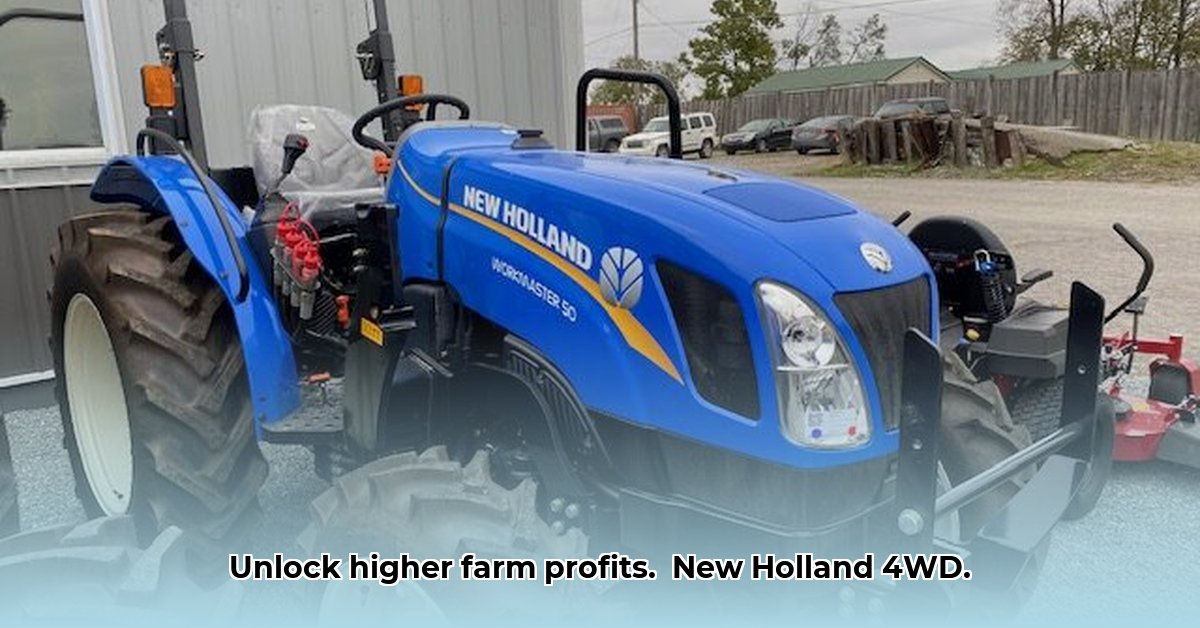
4WD New Holland Tractors: A Deep Dive into Sustainable Farming Practices
Farming faces constant pressures: rising costs, unpredictable weather, and growing concerns about environmental sustainability. 4WD New Holland T9 tractors offer a compelling solution, promising increased profitability and reduced environmental impact. This analysis explores their performance, financial implications, and broader stakeholder effects within the context of sustainable agriculture. Are you ready to optimize your farm's efficiency and environmental footprint? For more information on New Holland tractors, check out this helpful resource: New Holland tractors.
Power and Precision: Maximizing Yields and Minimizing Waste
The New Holland T9 series boasts impressive horsepower, ranging from 467 to 699 peak horsepower depending on the model 1. This raw power translates to faster fieldwork, enabling farmers to cover more acres in less time. But the T9's capabilities extend far beyond sheer strength. Advanced technologies, such as the IntelliView 12 display and Sidewinder Ultra armrest, provide real-time performance data, allowing for precise control of operations. This precision farming approach minimizes overlaps and waste, optimizing fuel consumption, and reducing the need for inputs like seeds and fertilizers. How much could you save on fuel and fertilizer by optimizing operations? The answer could significantly impact your bottom line.
Environmental Stewardship: Reducing Emissions and Protecting Resources
Sustainability is no longer optional; it's a necessity. The T9's Tier 4B/Final Stage V engines drastically reduce emissions compared to older models, minimizing your operation's carbon footprint. This environmental responsibility is increasingly important for brand image and consumer appeal, as consumers show greater preference for sustainably produced goods. Further, the inherent fuel efficiency translates directly into lower operating costs, yielding a win-win scenario for both environmental protection and profitability. What impact could a 10% reduction in fuel consumption have on your annual expenses? The numbers speak for themselves.
Financial Analysis: Assessing the Long-Term Return on Investment (ROI)
The New Holland T9 represents a substantial investment. However, the long-term ROI is often compelling due to several factors. Increased efficiency, lower fuel consumption, and higher yields contribute significantly to improved profitability. But potential downsides exist. The sophisticated technology increases the reliance on complex software and electronics, potentially leading to downtime. Therefore, a comprehensive maintenance plan is crucial. It is equally important to consider potential financing options. What are the key financial factors to consider when evaluating the ROI of a T9 tractor? This requires a thorough cost-benefit analysis.
Stakeholder Impact: A Ripple Effect of Sustainable Practices
The effects of adopting T9 tractors extend beyond individual farms, influencing numerous stakeholders:
- Large Farms: Experiencing immediate gains in efficiency, output, and reduced costs, leading to stronger market positioning and improved sustainability profiles.
- Small Farms: Potential for increased efficiency through collaborative efforts, access to shared resources, and potential government subsidies.
- Equipment Dealers: Benefit from increased sales and the creation of new service opportunities.
- Government Agencies: Witness reduced agricultural emissions and improved overall farming efficiency, reinforcing sustainability policies.
- Consumers: Gain access to sustainably produced food, boosting confidence in the ethical and environmentally conscious practices of farmers.
The Path Forward: Embracing Technological Advancements in Agriculture
The agricultural landscape is dynamic, constantly evolving with new technologies. The T9 series stands at the forefront of this innovation, integrating data analytics and precision technology for enhanced automation and efficiency. Continuous learning and adaptation are essential for maximizing the benefits of this equipment. This might involve workshops, online courses, or collaborating with agricultural consultants. Investment in knowledge is as crucial as investment in machinery itself. "The future of farming is about embracing innovation," explains Dr. Emily Carter, Agricultural Economist at Cornell University. "Technologically advanced tractors like the New Holland T9 are not just machines; they're tools that empower us to achieve improved productivity and sustainability."
Key Takeaways:
- Fuel efficiency translates to lower operating costs and reduced carbon emissions.
- Precision technology maximizes input use, minimizing waste and increasing yields.
- Minimizing soil compaction improves soil health and long-term productivity.
- High initial investment necessitates a careful financial analysis and comprehensive maintenance plan.